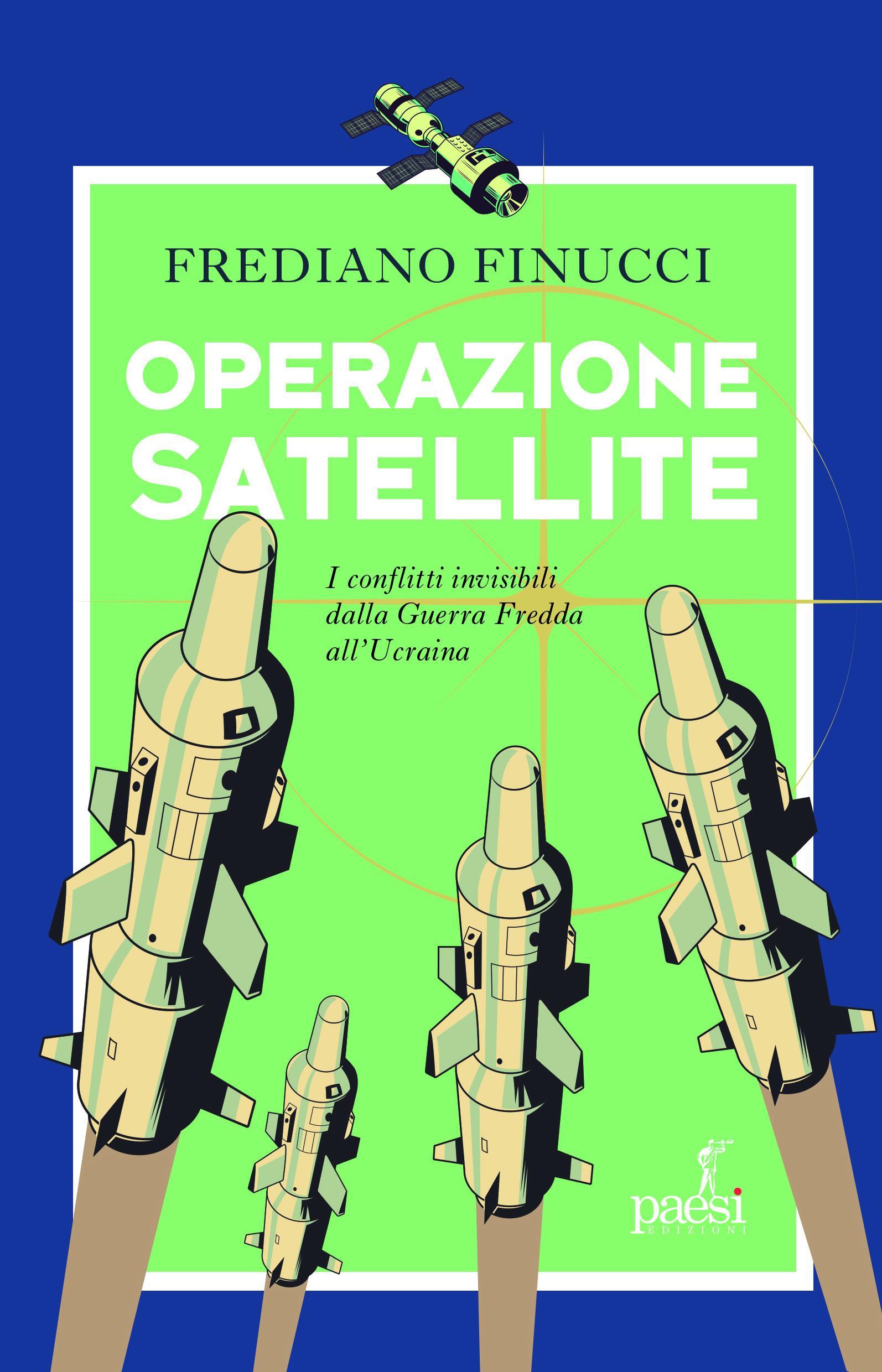Monday 11 March, 6pm
The Great Game of Satellites (Ed. Paesi) by Frediano Finucci
The author in conversation with Michele Groppi (King’s College) and Zeno Leoni (King’s College), chaired by Antonello Guerrera (La Repubblica)
Not only soldiers, ships or drones. The conflict in Ukraine has been fought even in Space with mutual attacks on civilian and military satellites by Moscow and Washington, since Russia’s occupation of Crimea. In The Great Game of Satellites, the author retraces for the first time, with unpublished documents and exclusive sources, the incredible and almost unknown skirmishes between superpowers, hundreds of miles away from the Earth. A rigorous investigation, a rare informative picture that reveals and explains the latest satellite technologies, once reserved only for the military and the governments, today also available to the wider public, with economic, social and geopolitical implications that were previously unthinkable.
The book retraces a little-known and mysterious episodes, such as for instance the sudden blackout (13 hours) of the entire GLONASS constellation (24 satellites), i.e. the Russian GPS supplied to Moscow armed forces, just 14 days after the 2014 Crimean referendum. Earlier events, technical evidence, reliable opinions and research on Western and Russian media conducted also with the aid of artificial intelligence, allow us to formulate the concrete hypothesis that it was an American attack. It then focuses on details of the Russian cyberattack on the Ukrainian satellite infrastructure a few hours before the invasion (24 February 2024) and the heavy consequences on civilian infrastructure of many Western countries, including Italy. We also learn how how Elon Musk was ready to support Kiev with his Starlink satellites months before the invasion and of his attempts to prevent Kiev from using its infrastructure to conduct attacks with explosive drones, as Ukraine did not pay for the internet service that he was offering; how Russia in the past launched “stalker” satellites into orbit to intercept and disturb communications from Western satellites and reconstruct the daily American and European activity to identify these threats and the related countermeasures; later on the book focuses on the famous episode of Chinese hot air balloons over American skies (January 2023) and explains how Beijing used them for highly advanced scientific experiments regarding renewable energies, quantum internet and innovative propulsion systems. Furthermore, the book tells how in the past years China has conducted experiments with Russia to disrupt satellite communications, techniques that Beijing could replicate, with special structures in the vent of invasion of Taiwan. The last chapters explore in an informative but rigorous way the latest satellites technologies (earth observation and artificial intelligence) that for the first time in history allow citizens to observe what is happening in every part of the globe almost in real time. An opportunity until now only reserved to soldiers or governmental agencies, a little-known technological revolution which is already having important and so far unthinkable economic, social and geopolitical implications. The book warns about the risks posed by the immense power that the three technological companies most focused on the Space Economy are accumulating, with apps that have become essential to both citizens and sovereign states: Google, Amazon, and in particular Starlink/Space X owned by Elon Musk: the person to keep an eye on.
Book your place HERE
Frediano Finucci (Lucca, 1968) is the head of the economic and foreign affairs editorial office of the TV channel La7, where he hosts the Omnibus program and for which he was special correspondent, correspondent from Brussels (2003-2006) and head of the editorial staff of the programme Otto e mezzo. Graduated in History of International Relations at the Cesare Alfieri Faculty of Political Science in Florence, he worked in the Milan newsrooms of Videomusic and TMC, focusing, as a reporter, on the entire Mani Pulite investigation.
Michele Groppi is lecturer in Defence Studies at the Defence Studies Department, King’s College London, where he convenes the Policy and Strategy Module. Member of the Institute of Directors in London, MIchele has authored peer reviewed articles on terrorism and radicalisation in Italy and Europe. Author of Light and Dark: Miuslims in Italy, Michele has appeared on BBC World, BBC News, Al Jazeera, DW and other international channels. A former professional athlete, he is president and founder of ITSS Verona, a British-Italian cultural association dedicated to the study of international security.
Zeno Leoni is a Lecturer in Defence Studies at the Defence Studies Department of King’s College London. He is also an affiliatre to the Lau China Institute of the same university, and the Executive Director of the International Team for the Study of Security Verona. His latest book is Grand Strategy and the Rise of China: Made in America, and he is currently working at a new monograph titled A New Cold War: US-China relations in the 21st Century. Dr Leoni has engaged both internationally renowned media such as BBC News, The Guardian, Corriere della Sera, among many others, and advised policy-makers in both the UK and Italy.





